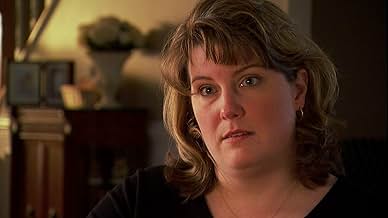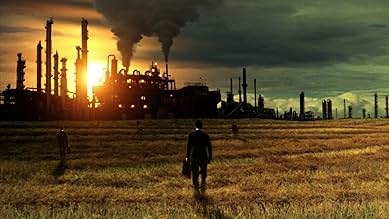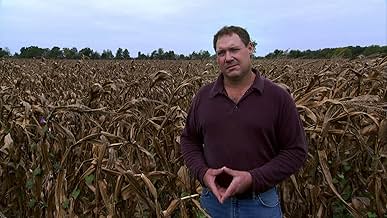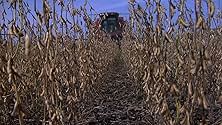Food, Inc.
- 2008
- Tous publics
- 1h 34min
NOTE IMDb
7,8/10
53 k
MA NOTE
Ajouter une intrigue dans votre langueAn unflattering look inside America's corporate controlled food industry.An unflattering look inside America's corporate controlled food industry.An unflattering look inside America's corporate controlled food industry.
- Réalisation
- Scénario
- Casting principal
- Nommé pour 1 Oscar
- 7 victoires et 20 nominations au total
Avis à la une
Food, Inc is essential viewing even though it's not a great movie. Much like An Inconvenient Truth its facts and accumulation of information trumps style or overall craft. This doesn't mean that the director isn't making a bad film or doesn't have some clever visual cues and transitions or know how to combine interviews and archival footage, since he does. But it's the precious interviews he gets, and just leaving the theater knowing that American food (or just stretching worldwide) is run by four corporations and that the farming industry as is advertised as "the American Farmer" is in deep trouble.
It's separated into sections, and each one has something interesting. The one that got to me personally was the section on chickens, how they, like cows as well, are genetically engineered to get bigger a lot faster than they used to, and how the working conditions are at best hazardous and at worst untenable. We see one woman interviewed, the only one who bucked her corporate bosses, to let the cameras in to the state of the chicken coop. Even if one hasn't seen a regular chicken coop before, the state of this place, the stark and dark mis-en-scene, gives us a picture of how it is. As someone like myself who likes a good piece of chicken every now and again, it made me about as guilty as imaginable.
But perhaps that's part of the point of Food, Inc - get us informed to the point where we're scared s***less. The downside may be the reach; while Inconvenient Truth had the boost of a Vice President, the big names in this documentary are authors, one of which wrote Fast Food Nation (and, surprisingly, eats a hamburger on camera, from a diner of course, and speaks about how burger and fries are some of his favorite food to eat despite the horrors of the fast food industry). So it's difficult to say how many people will see this who don't already have some idea about the atrocious conditions in slaughterhouses, the outbreaks of E-Coli that affect countless people including little Kevin as seen in the film, and Monsanto's patent of a soybean seed that they genetically altered. Between that last part alone and a little factoid made about Supreme Court justice Clarence Thomas, it's no wonder one leaves the theater flabbergasted.
There is some hope the film provides, however. A Virginia farmer, who treats all of his livestock with care and feeds them right (not copious amounts of CORN, which, by the way, is practically coming out of your ears as you read this), gives a few moments to reflect on how the ideal of the American farmer, of what they can give to the community and how they can try and be reasonable with having to do the inevitable of killing living things for food. Hell, the director even has Wal-Mart's one really good moment in the documentary sun in years with its endorsement of organic products. But whatever you're own persuasion on food- be you a hardcore vegan or someone just coming from McDonalds before the movie starts- Food, Inc can make some sort of difference, if only for the information. I know I may not stop eating certain foods, but I'll never forget to give another look or a double take on what's in it- or what may not be there at all. This movie is good, valuable stuff.
It's separated into sections, and each one has something interesting. The one that got to me personally was the section on chickens, how they, like cows as well, are genetically engineered to get bigger a lot faster than they used to, and how the working conditions are at best hazardous and at worst untenable. We see one woman interviewed, the only one who bucked her corporate bosses, to let the cameras in to the state of the chicken coop. Even if one hasn't seen a regular chicken coop before, the state of this place, the stark and dark mis-en-scene, gives us a picture of how it is. As someone like myself who likes a good piece of chicken every now and again, it made me about as guilty as imaginable.
But perhaps that's part of the point of Food, Inc - get us informed to the point where we're scared s***less. The downside may be the reach; while Inconvenient Truth had the boost of a Vice President, the big names in this documentary are authors, one of which wrote Fast Food Nation (and, surprisingly, eats a hamburger on camera, from a diner of course, and speaks about how burger and fries are some of his favorite food to eat despite the horrors of the fast food industry). So it's difficult to say how many people will see this who don't already have some idea about the atrocious conditions in slaughterhouses, the outbreaks of E-Coli that affect countless people including little Kevin as seen in the film, and Monsanto's patent of a soybean seed that they genetically altered. Between that last part alone and a little factoid made about Supreme Court justice Clarence Thomas, it's no wonder one leaves the theater flabbergasted.
There is some hope the film provides, however. A Virginia farmer, who treats all of his livestock with care and feeds them right (not copious amounts of CORN, which, by the way, is practically coming out of your ears as you read this), gives a few moments to reflect on how the ideal of the American farmer, of what they can give to the community and how they can try and be reasonable with having to do the inevitable of killing living things for food. Hell, the director even has Wal-Mart's one really good moment in the documentary sun in years with its endorsement of organic products. But whatever you're own persuasion on food- be you a hardcore vegan or someone just coming from McDonalds before the movie starts- Food, Inc can make some sort of difference, if only for the information. I know I may not stop eating certain foods, but I'll never forget to give another look or a double take on what's in it- or what may not be there at all. This movie is good, valuable stuff.
The Center for Disease Control and Prevention has estimated that foodborne diseases cause approximately 76 million illnesses, 325,000 hospitalizations, and 5,000 deaths in the United States each year. If you are the mother of two-year-old Kevin Kowalcyk who died in 2001 after eating a hamburger contaminated with E. Coli, however, statistics do not tell the story of crushing personal loss. The tragedy of Kevin's premature death spurred legislation (known as Kevin's Law) introduced by Rep. Anna G. Eshoo, D-Palo Alto, that would give the U.S. Department of Agriculture the power to close down plants that produce contaminated meat but it has failed repeatedly to pass the U.S. Congress because of opposition from the meat industry.
E-Coli outbreaks and other food-safety related issues are discussed in the outstanding documentary Food, Inc., directed by Robert Kenner, a film, graphic in part, that may leave you with a severe case of indigestion. Kenner is an unabashed advocate for greater food safety and the film with commentary by Eric Schlosser (Fast Food Nation) and Michael Pollan (The Omnivore's Dilemma).attempts to convince the public of the shortsightedness of the mega-corporations that dominate the food industry and their "faster, fatter, bigger, cheaper," method of increasing profits often at the expense of public safety. Representatives from food-producing giants such as Monsanto, Smithfield, Tyson and Perdue that control our food supply were invited to be interviewed for the film but declined or did not respond to Kenner's request. According to Schlosser, "The industry doesn't want you to know the truth about what you're eating - because if you knew, you might not want to eat it."
Interviewing farmers and ranchers, Kenner learned that they are mostly at the mercy of mega-corporations like Monsanto which have increased their share of the soybean market from 2% to 90% in the last decade. Monsanto developed their own custom gene for soybeans and now threaten their customers with lawsuits for patent infringement if they save their own seeds to use the next year. The film observes that part of the reason why the food industry is so hard to regulate is that many of the government officials currently assigned to watchdog roles were once employed by the companies they now monitor and notes that FDA food inspections have plummeted from 50,000 in 1972 to 9,200 in 2006.
Other subjects covered are the treatment of cows that are forced to eat corn instead of grass (which then goes into Coke, high fructose corn syrup, diapers, decongestants, and batteries) and the dreadful conditions of chickens that are herded into darkened cages before they are slaughtered. On that subject, Kenner interviews Carole Morrison who was unwilling to jam her chickens into cages without sunlight and, as a result, had her contract canceled by a giant chicken conglomerate who refused to have any further business dealings with her. Also discussed are the growing rates of diabetes in young people, the soaring incidence of obesity, and the use of low paying illegal immigrants to work in the food processing industry.
In spite of the horror stories, however, Food, Inc. is not depressing and Kenner seems more interested in educating the public than frightening them. He shows that people can make a difference by citing the tobacco industry as well as the efforts of an entrepreneur from Stonyfield Farms who sold his line of organic products to Wal-Mart and a Virginia farmer who insists on raising animals with dignity and respect. To the strain of Bruce Springsteen singing Woody Guthrie's "This Land is Your Land", advice on how individuals can make a difference include – buy locally, shop in farmer's markets where possible, seek out quality and organic products even if they cost a bit more, and be sure to read the labeling to learn where a product comes from and the ingredients it contains.
Food, Inc. by itself may not be the catalyst that will preserve our health and well being and make food taste the way it did fifty years ago, but it is an important start and should be seen by anyone who eats, that means all of us. As the director puts it, "I think we're beginning to see the dangers of this inexpensive food that these big agribusinesses are producing. And the more we can see the cracks in this system, the faster it's going to fall apart. I'm hoping that this film can help people to start to think about it People are becoming much more conscious of their food, and the more we think about it, the more good food we're going to get." I'll vote for that.
E-Coli outbreaks and other food-safety related issues are discussed in the outstanding documentary Food, Inc., directed by Robert Kenner, a film, graphic in part, that may leave you with a severe case of indigestion. Kenner is an unabashed advocate for greater food safety and the film with commentary by Eric Schlosser (Fast Food Nation) and Michael Pollan (The Omnivore's Dilemma).attempts to convince the public of the shortsightedness of the mega-corporations that dominate the food industry and their "faster, fatter, bigger, cheaper," method of increasing profits often at the expense of public safety. Representatives from food-producing giants such as Monsanto, Smithfield, Tyson and Perdue that control our food supply were invited to be interviewed for the film but declined or did not respond to Kenner's request. According to Schlosser, "The industry doesn't want you to know the truth about what you're eating - because if you knew, you might not want to eat it."
Interviewing farmers and ranchers, Kenner learned that they are mostly at the mercy of mega-corporations like Monsanto which have increased their share of the soybean market from 2% to 90% in the last decade. Monsanto developed their own custom gene for soybeans and now threaten their customers with lawsuits for patent infringement if they save their own seeds to use the next year. The film observes that part of the reason why the food industry is so hard to regulate is that many of the government officials currently assigned to watchdog roles were once employed by the companies they now monitor and notes that FDA food inspections have plummeted from 50,000 in 1972 to 9,200 in 2006.
Other subjects covered are the treatment of cows that are forced to eat corn instead of grass (which then goes into Coke, high fructose corn syrup, diapers, decongestants, and batteries) and the dreadful conditions of chickens that are herded into darkened cages before they are slaughtered. On that subject, Kenner interviews Carole Morrison who was unwilling to jam her chickens into cages without sunlight and, as a result, had her contract canceled by a giant chicken conglomerate who refused to have any further business dealings with her. Also discussed are the growing rates of diabetes in young people, the soaring incidence of obesity, and the use of low paying illegal immigrants to work in the food processing industry.
In spite of the horror stories, however, Food, Inc. is not depressing and Kenner seems more interested in educating the public than frightening them. He shows that people can make a difference by citing the tobacco industry as well as the efforts of an entrepreneur from Stonyfield Farms who sold his line of organic products to Wal-Mart and a Virginia farmer who insists on raising animals with dignity and respect. To the strain of Bruce Springsteen singing Woody Guthrie's "This Land is Your Land", advice on how individuals can make a difference include – buy locally, shop in farmer's markets where possible, seek out quality and organic products even if they cost a bit more, and be sure to read the labeling to learn where a product comes from and the ingredients it contains.
Food, Inc. by itself may not be the catalyst that will preserve our health and well being and make food taste the way it did fifty years ago, but it is an important start and should be seen by anyone who eats, that means all of us. As the director puts it, "I think we're beginning to see the dangers of this inexpensive food that these big agribusinesses are producing. And the more we can see the cracks in this system, the faster it's going to fall apart. I'm hoping that this film can help people to start to think about it People are becoming much more conscious of their food, and the more we think about it, the more good food we're going to get." I'll vote for that.
Did you know that it only takes 48 days for a chicken to go to market. Is this natural? This film explores how food is grown, and the concerns that people have, such as the e-coli outbreak that seems to happen every year. I am a lover of meat, but after this film you will want to change some of your practices like switching to Organic etc. This film also explores demand for certain products that are not Genetically modified.
We all have to eat but we can make decisions based on facts, instead of based on perception. People need to be aware that their consequences may have dire repercussions, so if you need to eat, and we all do, then go out and see this.
We all have to eat but we can make decisions based on facts, instead of based on perception. People need to be aware that their consequences may have dire repercussions, so if you need to eat, and we all do, then go out and see this.
I recall a story where a teacher had tasked her students to draw a picture of a chicken for art class, and to her surprise, one of them drew a chicken fillet. I suppose the point here is that we've become so detached from the origins of our food sources, save for the form they take when already in the supermarkets, cured and prepared with ready to cook/eat processes becoming the norm of our daily lives. And with periodic cases of food scares and poisoning, this film takes a look throughout the food chain of today, and although it's rather US-centric, it still has plenty of relevance here since after all, we import almost everything.
With technological research applied to our food sources, be it the humble grain or to the meat to satisfy all us omnivores out there, the drive of course is to produce enough to feed all the mouths, although sometimes things get done out necessity, and spiral out of control when the pressure's there to produce food that can grow faster, fatter, and to shorten the time it takes to get to the dining table.
Directed by Robert Kenner, this is a documentary that followed some of the points that you would have become familiar with in films like Fast Food Nation, whose writer also provided an interview and laid the foundations of our predicament quite squarely on the MacDonald brothers, who had revolutionized the way food gets prepared, presented, and sourced. Kenner cleverly sections the film into digestible chunks, each focused on aspects of the food chain and the products themselves. The stark images and footage on how animals are treated as products in an assembly line subjected to the mass production (killing) process, will definitely shock you into thinking – that cannot be right, nor humane. Will it make you swear off meat? Probably.
In fact, the picture got painted in very bleak terms, where food conglomerates continue to grow in size and profits, resulting in the power they have over consumers, politicians and the likes, where choice and options are but a facade on shelves because the brands and products all belong to common parents. Corporations exists for profits, and are not responsible for consequences arising from their drive to make money. Everything else that resulted from that drive, whether or not a negative impact on society and human lives, can be considered collateral in their goal to feed the earth, and profit from it. Naturally, none of the conglomerate representatives wanted to be interviewed for the film, and that comes with no surprise, especially when their underhanded tactics in dealing with opposition, and corrupt practices get exposed through hidden cameras.
And in some ways, the film too makes you feel a little guilty for being part of the fuel on the demand side of things. With demand comes the opportunity to supply, and make money, and corporate social responsibility is still something relatively new as a buzzword that has plenty of room to be translated into action.
But the film is not all noise in complaining and presenting a doomsday scenario, and that's where the film earned merits in providing workable alternative solutions rather than just barking up a tree. It balanced the issues on what we could do, and engages the audience to be catalyst for change, making one realize that one has the power to skew demand to more acceptable methods of production, rather than one bred on convenience. It's not all serious nature here, as Kenner does inject enough well-placed humour into the documentary so that it doesn't come off as too heavy-handed in treatment, in pointing the loaded guns of blame onto others.
Food, Inc. is an incredible documentary about where our food comes from, and for those without an inkling of knowledge, it would be worthwhile to sit through this film and get some enlightenment. More importantly of course, is to take action to prevent our stomachs from becoming just repositories for Salt, Fat and Sugar. Highly Recommended.
With technological research applied to our food sources, be it the humble grain or to the meat to satisfy all us omnivores out there, the drive of course is to produce enough to feed all the mouths, although sometimes things get done out necessity, and spiral out of control when the pressure's there to produce food that can grow faster, fatter, and to shorten the time it takes to get to the dining table.
Directed by Robert Kenner, this is a documentary that followed some of the points that you would have become familiar with in films like Fast Food Nation, whose writer also provided an interview and laid the foundations of our predicament quite squarely on the MacDonald brothers, who had revolutionized the way food gets prepared, presented, and sourced. Kenner cleverly sections the film into digestible chunks, each focused on aspects of the food chain and the products themselves. The stark images and footage on how animals are treated as products in an assembly line subjected to the mass production (killing) process, will definitely shock you into thinking – that cannot be right, nor humane. Will it make you swear off meat? Probably.
In fact, the picture got painted in very bleak terms, where food conglomerates continue to grow in size and profits, resulting in the power they have over consumers, politicians and the likes, where choice and options are but a facade on shelves because the brands and products all belong to common parents. Corporations exists for profits, and are not responsible for consequences arising from their drive to make money. Everything else that resulted from that drive, whether or not a negative impact on society and human lives, can be considered collateral in their goal to feed the earth, and profit from it. Naturally, none of the conglomerate representatives wanted to be interviewed for the film, and that comes with no surprise, especially when their underhanded tactics in dealing with opposition, and corrupt practices get exposed through hidden cameras.
And in some ways, the film too makes you feel a little guilty for being part of the fuel on the demand side of things. With demand comes the opportunity to supply, and make money, and corporate social responsibility is still something relatively new as a buzzword that has plenty of room to be translated into action.
But the film is not all noise in complaining and presenting a doomsday scenario, and that's where the film earned merits in providing workable alternative solutions rather than just barking up a tree. It balanced the issues on what we could do, and engages the audience to be catalyst for change, making one realize that one has the power to skew demand to more acceptable methods of production, rather than one bred on convenience. It's not all serious nature here, as Kenner does inject enough well-placed humour into the documentary so that it doesn't come off as too heavy-handed in treatment, in pointing the loaded guns of blame onto others.
Food, Inc. is an incredible documentary about where our food comes from, and for those without an inkling of knowledge, it would be worthwhile to sit through this film and get some enlightenment. More importantly of course, is to take action to prevent our stomachs from becoming just repositories for Salt, Fat and Sugar. Highly Recommended.
This documentary does a good job educating the consumers on how food is produced,packed and marketed in U.S nowadays. By going back repeatedly to how it was before it shows us how much it has evolved and also the effects of those drastic changes on food prices, American eating habits and ultimately on their health. The movie does all that without ever going over the top or becoming apocalyptic, which seems to be a trend for these type of movies nowadays,it does call out the greedy mega food corporation and the state officials for not arming the regulatory agencies better but the consumers are also at fault here for not informing themselves enough on the content of the products in order to choose what's best for their health not just for their wallet.
Le saviez-vous
- AnecdotesOn the Region 1 DVD packaging, the UPC bar-code on the cow is different from the one shown on the theatrical poster. The bar-code on the poster is 4-73762-52481-6-(18). The bar-code on the Region 1 DVD packaging is 8-76964-00216-5 : the same bar-code that appears on the back cover of the DVD. As of 2022, the bar-code used on the poster is not an active code.
- Citations
Michael Pollan: There are no seasons in the American supermarket. Now there are tomatoes all year round, grown halfway around the world, picked when it was green, and ripened with ethylene gas. Although it looks like a tomato, it's kind of a notional tomato. I mean, it's the idea of a tomato.
- ConnexionsFeatured in Au coeur de la nuit: Tim Raue und Dave Arnold (2009)
- Bandes originalesSunny L.A.
Written by Nancy Peterson
Performed by Great American Swing Band
Meilleurs choix
Connectez-vous pour évaluer et suivre la liste de favoris afin de recevoir des recommandations personnalisées
- How long is Food, Inc.?Alimenté par Alexa
Détails
- Date de sortie
- Pays d’origine
- Site officiel
- Langue
- Aussi connu sous le nom de
- P.O.V. Food, Inc. episode #23.1
- Lieux de tournage
- Sociétés de production
- Voir plus de crédits d'entreprise sur IMDbPro
Box-office
- Montant brut aux États-Unis et au Canada
- 4 417 674 $US
- Week-end de sortie aux États-Unis et au Canada
- 60 513 $US
- 14 juin 2009
- Montant brut mondial
- 4 606 199 $US
- Durée1 heure 34 minutes
- Couleur
- Mixage
- Rapport de forme
- 1.78 : 1
Contribuer à cette page
Suggérer une modification ou ajouter du contenu manquant

Lacune principale
By what name was Food, Inc. (2008) officially released in India in English?
Répondre























